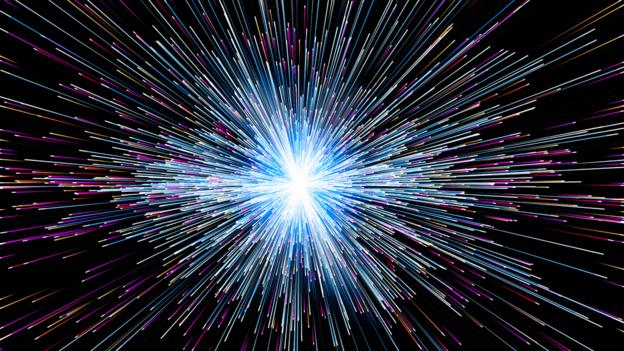
(Copyright: Science Photo Library)
Einstein said it is impossible, but as Jennifer Ouellette explains some
scientists are still trying to break the cosmic speed limit – even if
it means bending the laws of physics.
"It is impossible to travel faster than light, and certainly not desirable, as one's hat keeps blowing off."
Woody Allen, Side Effects
Woody Allen, Side Effects
Last
summer, a small neutrino experiment in Europe called OPERA (Oscillation
Project with Emulsion tRacking Apparatus) stunned the world with a
preliminary announcement that it had clocked neutrinos travelling just a
few fractions of a second faster than the speed of light. The news even briefly overshadowed the far more recognizable Large Hadron Collider’s ongoing hunt for the Higgs boson.
Despite
careful hedging by scientists, the popular imagination jumped right
from neutrinos to a viable spacecraft for fast interstellar travel.
After all, the prospect of faster-than-light (FTL) travel has been a
science fiction staple for decades, from wormholes and Star Trek’s original warp drive, to the FTL “jumps” used to evade the Cylons in SyFy’s Battlestar Galactica
reboot. It takes years, decades, centuries even to cross the vast
expanses of space with our current propulsion technology – a realistic
depiction of the tedium of space travel in entertainment would likely
elicit the viewer equivalent of “Are we there yet?”
So the OPERA
announcement was bound to generate excitement, even if the neutrinos in
question were only moving nanoseconds faster than light – hardly
sufficient to outrun the Cylons, but nevertheless faster than c, the
cosmic speed limit set by Albert Einstein back in 1905.
Unfortunately, the euphoria was premature: the OPERA results were incorrect,
thanks to a calibration error. The culprit: a faulty cable connection
in the GPS system used to time the neutrinos along their journey. That
killjoy Einstein wins again.
But if the OPERA saga did tell us
anything, it’s that the idea of travelling faster than light continues
to capture the imagination. As Hollywood screenwriter Zack Stentz (Thor,
a.k.a. “Vikings in Space”) said recently at a Los Angeles panel on the science of superheroes,
“Every science fiction writer who wants to get out of the solar system
[within a human lifetime] gloms onto that. It’s the leap of faith that
lets you tell stories on this bigger canvas.”
“You cannae change the laws of physics”
“Leap
of faith” is a particularly relevant phrase to use here. The fact is
we’ll never be able to travel beyond the speed of light, at least based
on our current understanding of established physics.
As any object
with mass accelerates – like a proton in the LHC – it gains energy,
always needing just a little bit more energy to accelerate even further.
The LHC, the largest and highest-energy particle accelerator we have,
boosts protons as close to the speed of light as we can get, but they
never quite hit the mark. If a proton did achieve that speed, it would
need infinite energy to go any faster, and we don’t have an infinite
supply of energy.
Equations don’t tend to lie, especially ones
that have been tested and re-tested in countless experiments for over a
century. For all practical intents and purposes, the speed of light is
an insurmountable threshold.
But physicists would never make any
progress at all if they threw in the towel quite that easily, and nobody
thinks Einstein will have the final word in perpetuity. Many scientists
are happy to consider the possibility of violations of relativistic
principles, even if none have yet been experimentally confirmed.
One of the earliest proposed possibilities for FTL travel involved a hypothetical particle called a tachyon,
capable of tunnelling past the speed of light barrier. This turned out
to be more of a mathematical artifact rather than an actual physical
particle.
However, another reason for all the OPERA-tic excitement
was that back in 1985, physicists proposed that some high-energy
neutrinos might really be tachyons,
capable of interacting with an as-yet-known field, giving them just
enough of an energy boost to break through the barrier. Such
tachyon-like neutrinos would supersede photons as the fastest particles
in the universe.
http://www.bbc.com/future/story/20121003-can-we-travel-faster-than-light

Nenhum comentário:
Postar um comentário